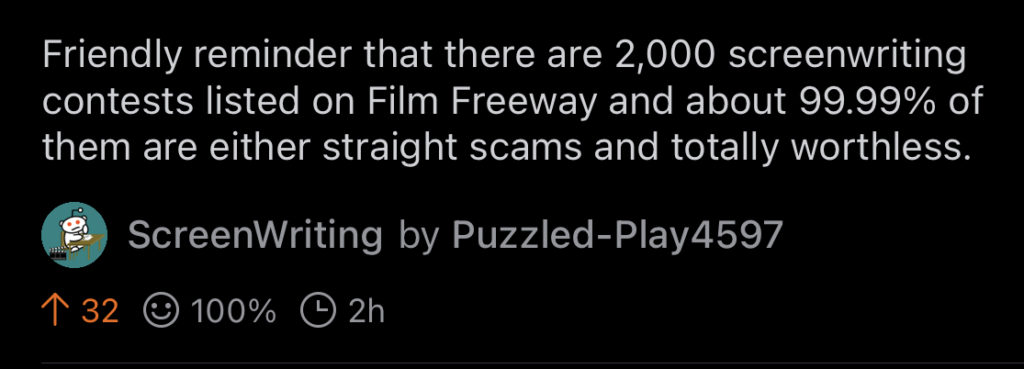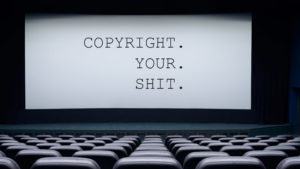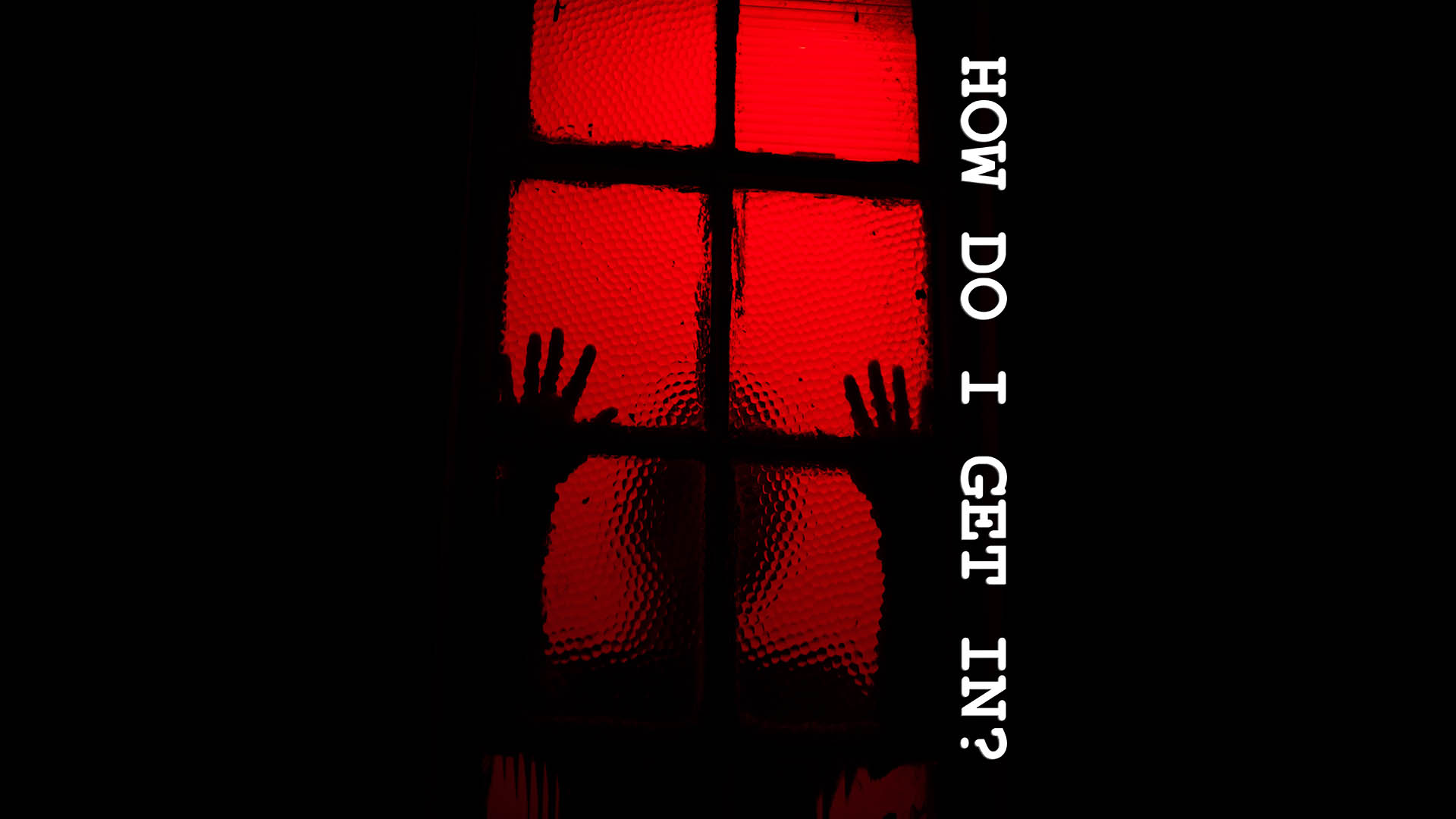You’re going to hear a lot about screenwriting contents.
It’s mostly bullshit.
They’re mostly bullshit.
There are a few exception.

You do not need to win a screenwriting competition to enter the industry, but it may help. Maybe. YMMV.
Here are some of the few screenwriting competitions that are possibly not a complete waste of time and money…
List of Screenwriting Competitions Worth Entering
- The Academy Nicholl Fellowships in Screenwriting
Yes, that Academy, the Oscar The Gold people. The Nicholl Fellowships is the screenwriting competition associated with the Academy of Motion Picture Arts and Sciences.
The Nicholl Fellowships competition is the most prestigious screenwriting contest you can possibly win in the world of screenwriting. Winning Nicholl comes with more than cash and limited bragging rights, you also get into a training program and they introduce the winners to people in the business.
HOWEVER… it is still far less impressive than selling or being hired to write a script for a real producer. If you can do that, you can skip this and all other contests, they will not matter.
No, winning a Nicholl Fellowship doesn’t automatically get you a ticket to the Oscars. - The Austin Film Festival
The Austin Film Festival is a pretty big deal down in Texas. Not just a film festival and screenwriting competition, it also features the top screenwriting conference. Attend the conference if you can, it’s good for beginners, intermediates, and even the old fogeys.
As with most competitions, you can pay to get extra feedback on your script, even if you don’t win. But just like with almost any other screenwriting competition, the quality of notes you get back and vary wildly. This has been highlighted by writers on social media who got back bizarre notes that made no sense, notes that seemed to be about a different screenplay than the one the writer submitted, and other unhelpful results.
The Austin Film Festival’s screenplay contest has clearly had some hiccups in the judging process over the last few years. They seem to be having difficulty with the volume of submissions and getting qualified unpaid volunteer readers.
What’s strangest perhaps is that they haven’t really owned any of the damage publicly. No one took responsibility for the failures. Usually if you get terrible notes you get an apology, and if hundreds of people get terrible notes you see a public apology. We didn’t see that coming out of Austin for either of the last two competitions. It’s been weird. Hopefully, they can resolve their organizational issues by the next round. Maybe they’ll limit the number of submissions to what they can handle. Just play it by ear. - Script Pipeline
Script Pipeline, Film Pipeline, and Book Pipeline are all from the same company, and they tend to do a very good job at what they do.
Script Pipeline has several different screenwriting and pitch competitions throughout the year. Theirs is possibly the best TV writing competition.
Most screenwriting competitions take a long time to judge the work that’s submitted. Some can take 4-5 months or longer from the early submission deadline to even a semifinal round. But, if you don’t want to wait all that time to hear anything, and your primary objective is improving your writing, you can skip the wait and pay for a workshop session on your script with a professional reader.
Also, check out the Pipeline Artists free online arts magazine they run. - Imagine Impact
This competition from Imagine Entertainment (founded by film and TV producers Brian Glazer and Ron Howard) tends to be a contest organized for a different sponsor each time it’s run.
It also tends to be a genre competition, but the genre changes every time. It isn’t run at regular intervals, you need to be on their mailing list to know when it’s happening next and what all the new parameters are.
This is very much an education-focused competition, so if you win you get a learning experience in addition to whatever other prizes are offered.
In addition to (usually) needing to submit a completed screenplay, an extensive questionnaire is normally a bit part of how one applies for Imagine Impact. They may also ask you to record yourself talking about something. - Page International Screenwriting Awards
Another established competition for screenwriters with a decent judging process and valuable prizes. - Final Draft Big Break Screenwriting Contest
Final Draft, the software company, hosts this annual competition. - see also: Lauri’s List of Screenwriting Fellowships, Labs, and Contests
Screenwriting Competitions In Context
Placing high or even winning a screenwriting competition is not going to be a golden ticket for breaking into the film industry, but may offer you an opportunity to contact agents and managers with more than your own “I think I’m good” behind you.
The vast majority of managers and producers are NOT following the screenwriting competitions. Some do, but most likely even if you win you’ll still need to reach out and tell people your script won something.
The higher up in power and authority an agent, manger, or producer is, the less likely they will care that you won a public contest. When you already have great writers beating down your door, you don’t need to go fishing.
Contests Are Not The Real Industry, They Don’t Matter
Sometimes your script may be read by the wrong readers for your material, these things are VERY subjective. A script that doesn’t place at all one year might win the next season.
How They’re Useful
Contests may also provide a brief opportunity to network with judges, sponsors, and other writers. Take advantage of it, but try to be open, not needy. This is a long road.
It’s highly unlikely you’ll be just contacted out of nowhere by the perfect manager or really anyone reputable simply because you won a contest, even a big one. You’ll still have a lot of work to do to connect with the representatives who are right for you, and you need to have more than just one solid script to show when you talk to them. See Access for more info.
Beware of Scavengers
If you are contacted out of the blue following success or even just participation in a contest, be extremely wary of scams and con artists. The bottom-feeding predators troll the desperate waters.
Generally, the more paid advertising you see screenwriting competitions doing, the less likely they are to be organized for your benefit.
Sorry, did you just see a blue cat run through here? Don’t touch it, pretty sure it has parasites.
Make friends with other screenwriters and listen to your community. You’re most likely to hear about cool opportunities to showcase your work from your comrades.
Repeat after me now: never pay to work.
“Thank your readers and the critics who praise you, and then ignore them. Write for the most intelligent, wittiest, wisest audience in the universe: Write to please yourself.” – Harlan Ellison
Screenwriting competitions can offer valuable opportunities for writers to gain recognition and showcase their work. However, it is crucial for participants to remain vigilant against potential scams, especially if approached unexpectedly after a contest.
A notable correlation exists between the extent of paid advertising and the likelihood of a competition being beneficial to writers. Engaging with fellow screenwriters can also lead to discovering legitimate opportunities and avoiding pitfalls in the industry.
Networking with other writers can open doors to collaborations and mentorships that enhance your craft. Attend workshops and literary events to connect with those who share your passion.
Always prioritize your artistic integrity, as the quality of your work defines your reputation more than any competition.
Seek feedback from trusted peers, but remember that your unique voice is what ultimately matters in storytelling.
Stay committed to your vision, and let your creativity guide you on your writing journey.
Continue Browsing:
- Copyrighting A Screenplay

- Cures For Writer’s Block

- Excellent Books on Screenwriting

- Getting In

- Lawyers for Screenwriters

- Network

- Schools

- Screenwriting Blogs

- Screenwriting Competitions

- Screenwriting Podcasts

- Screenwriting Software

- Screenwriting Videos

- Scripts to Read

- The Best Movies For A Screenwriter To Watch

- Tips





















